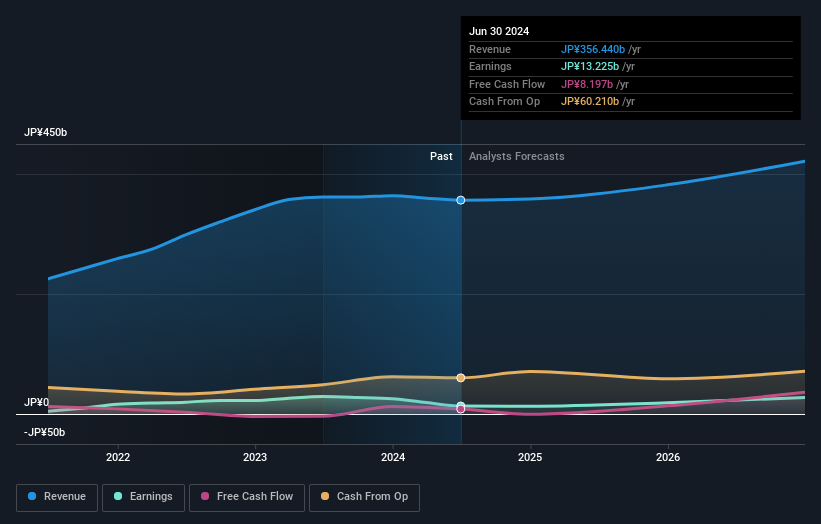Tokai Carbon Co., Ltd.'s (TSE:5301) market cap touched JP¥206b last week, benefiting both retail investors who own 52% as well as institutions

Key Insights
- Significant control over Tokai Carbon by retail investors implies that the general public has more power to influence management and governance-related decisions
- 48% of the business is held by the top 25 shareholders
- 48% of Tokai Carbon is held by Institutions
To get a sense of who is truly in control of Tokai Carbon Co., Ltd. (TSE:5301), it is important to understand the ownership structure of the business. The group holding the most number of shares in the company, around 52% to be precise, is retail investors. That is, the group stands to benefit the most if the stock rises (or lose the most if there is a downturn).
Following a 11% increase in the stock price last week, retail investors profited the most, but institutions who own 48% stock also stood to gain from the increase.
Let's delve deeper into each type of owner of Tokai Carbon, beginning with the chart below.
See our latest analysis for Tokai Carbon

What Does The Institutional Ownership Tell Us About Tokai Carbon?
Many institutions measure their performance against an index that approximates the local market. So they usually pay more attention to companies that are included in major indices.
We can see that Tokai Carbon does have institutional investors; and they hold a good portion of the company's stock. This can indicate that the company has a certain degree of credibility in the investment community. However, it is best to be wary of relying on the supposed validation that comes with institutional investors. They too, get it wrong sometimes. If multiple institutions change their view on a stock at the same time, you could see the share price drop fast. It's therefore worth looking at Tokai Carbon's earnings history below. Of course, the future is what really matters.

Tokai Carbon is not owned by hedge funds. Looking at our data, we can see that the largest shareholder is Nomura Asset Management Co., Ltd. with 6.8% of shares outstanding. The second and third largest shareholders are Nikko Asset Management Co., Ltd. and Mitsubishi UFJ Trust and Banking Corporation, Asset Management Arm, with an equal amount of shares to their name at 3.8%.
A deeper look at our ownership data shows that the top 25 shareholders collectively hold less than half of the register, suggesting a large group of small holders where no single shareholder has a majority.
While it makes sense to study institutional ownership data for a company, it also makes sense to study analyst sentiments to know which way the wind is blowing. Quite a few analysts cover the stock, so you could look into forecast growth quite easily.
Insider Ownership Of Tokai Carbon
The definition of an insider can differ slightly between different countries, but members of the board of directors always count. The company management answer to the board and the latter should represent the interests of shareholders. Notably, sometimes top-level managers are on the board themselves.
Most consider insider ownership a positive because it can indicate the board is well aligned with other shareholders. However, on some occasions too much power is concentrated within this group.
Our data suggests that insiders own under 1% of Tokai Carbon Co., Ltd. in their own names. It is a pretty big company, so it would be possible for board members to own a meaningful interest in the company, without owning much of a proportional interest. In this case, they own around JP¥507m worth of shares (at current prices). It is always good to see at least some insider ownership, but it might be worth checking if those insiders have been selling.
General Public Ownership
The general public, who are usually individual investors, hold a substantial 52% stake in Tokai Carbon, suggesting it is a fairly popular stock. This size of ownership gives investors from the general public some collective power. They can and probably do influence decisions on executive compensation, dividend policies and proposed business acquisitions.
Next Steps:
While it is well worth considering the different groups that own a company, there are other factors that are even more important. To that end, you should be aware of the 2 warning signs we've spotted with Tokai Carbon .
Ultimately the future is most important. You can access this free report on analyst forecasts for the company.
NB: Figures in this article are calculated using data from the last twelve months, which refer to the 12-month period ending on the last date of the month the financial statement is dated. This may not be consistent with full year annual report figures.
Valuation is complex, but we're here to simplify it.
Discover if Tokai Carbon might be undervalued or overvalued with our detailed analysis, featuring fair value estimates, potential risks, dividends, insider trades, and its financial condition.
Access Free AnalysisHave feedback on this article? Concerned about the content? Get in touch with us directly. Alternatively, email editorial-team (at) simplywallst.com.
This article by Simply Wall St is general in nature. We provide commentary based on historical data and analyst forecasts only using an unbiased methodology and our articles are not intended to be financial advice. It does not constitute a recommendation to buy or sell any stock, and does not take account of your objectives, or your financial situation. We aim to bring you long-term focused analysis driven by fundamental data. Note that our analysis may not factor in the latest price-sensitive company announcements or qualitative material. Simply Wall St has no position in any stocks mentioned.
About TSE:5301
Tokai Carbon
Manufactures and sells carbon-related products and services in Japan.
Flawless balance sheet with reasonable growth potential.
Similar Companies
Market Insights
Community Narratives




